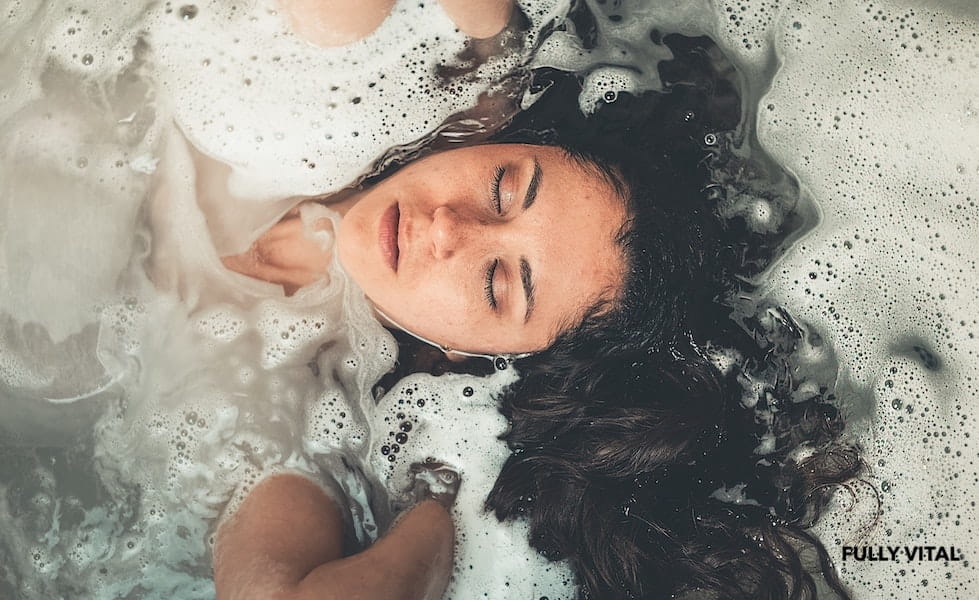
Is Salt Water Good for Your Hair? Uncovering The Truth
Who doesn’t dream of achieving those perfect beachy waves and textured hair? “Is salt water good for your hair?” might just be the question on your mind.
Salt water might just be the answer to your hair dreams, but it’s not all sunshine and rainbows.
In this blog post, we’ll delve into the science behind salt water and hair, the pros and cons, and tips to protect your hair from salt water damage. Let’s dive in!
Short Summary
-
Salt water can nourish, add texture and volume, promote hydration, and increase natural oils for beautiful beachy waves.
-
With proper protection before & after swimming in salt water you can reap the benefits while avoiding potential damage.
-
DIY treatments provide a cost effective alternative to store bought products that help protect hair from damage!
The Science Behind Salt Water and Hair
Salt water has the potential to nourish and add texture and volume to hair, creating beautiful beachy waves.
It can also help draw water out of hair and scalp, leading to hydration and an increase in natural oils, which can be beneficial for naturally greasy hair.
This unique interaction between salt water and hair is due to the hygroscopic nature of the water, the nutrients and minerals present in sea water, and the role of osmosis in maintaining hair health.
Are you intrigued? Let’s dive deeper into these aspects!

I LOVE MY HAIR NOW
FullyVital hair serum and hair vitamins made tremendous improvements in my hair. I truly love my hair now.
Meg S.,
The Hygroscopic Nature of Salt Water
The amazing hygroscopic nature of salt water refers to its ability to attract and hold water molecules from the surrounding environment. This can help to condition and hydrate hair strands and scalp, making it especially helpful for those with oily or greasy scalps.
However, there’s a catch. Too much moisture can cause hair to become overly hydrated, leading to dryness, brittleness, and hair damage.
So, while the hygroscopic nature of salt water can be beneficial, it’s essential to strike the right balance to keep your hair healthy and vibrant.
Nutrients and Minerals in Sea Water
Sea water, also known as ocean water, is abundant in beneficial nutrients and minerals such as amino acids, magnesium, potassium, selenium, and zinc.
These elements can help improve hair health by exfoliating the scalp, eliminating product build-up, and stimulating blood flow to the hair roots.
But just like the hygroscopic nature of salt water, there are potential drawbacks.
Prolonged exposure to salt water, especially if your hair is chemically treated or dyed, can cause dryness, brittleness, and hair damage.
So, while the nutrients in sea water can be good for your hair, proper care is necessary to avoid negative effects.
The Role of Osmosis
Osmosis is a process that helps water molecules move from an area of lower salt concentration to an area of higher salt concentration.
This process helps keep the hair shafts hydrated, thus strengthening the hair over time and can be helpful for oily or greasy scalps.
However, too much hydration can cause hair to become overly saturated, leading to dryness, brittleness, and hair damage.
So, while osmosis plays a beneficial role in maintaining hair health, it’s essential to strike the right balance between hydration and hair care to avoid potential harm.
Is Salt Water Good For Your Hair: Pros and Cons
Now that we’ve explored the science behind salt water and hair, let’s take a closer look at its pros and cons.
While salt water can provide texture and volume, act as a natural shampoo and grease remover, and has anti-fungal properties that can help against dandruff caused by a fungus, it’s important to remember that too much salt water exposure can lead to dry and brittle hair, which may increase the chances of breakage and hair loss.
With this double-edged sword in mind, let’s delve into the specific pros and cons of salt water for hair.
Pro: Texture and Volume Boost
One of the most appealing benefits of salt water is its ability to enhance hair texture and volume, giving it that sought-after beachy wave look.
When salt water interacts with hair, it can add a unique texture, making it easier to manage and helping it to clump together and stay tangle-free, which can prevent breakage.
So, if you’re after those beautiful beach waves, salt water can be your best friend!
Just make sure to protect your hair from potential damage, which we’ll discuss shortly.
Pro: Scalp Exfoliation and Blood Flow Stimulation
Another pro of salt water is its ability to act as a natural exfoliator and stimulate blood flow to the scalp.
This can help improve circulation and transport beneficial nutrients to the hair follicles, promoting strong and healthy hair growth.
However, it’s essential to be mindful of the amount of salt water used, as too much can cause dehydration and damage to the hair and scalp.
Striking the right balance is key to reaping the benefits of salt water without causing harm.
Con: Dryness and Brittleness
While salt water can provide numerous benefits for your hair, it’s not without its drawbacks.
Prolonged exposure to salt water can cause hair to become dry and brittle, especially for those with chemically treated or dyed hair.
This can increase the chances of breakage and hair loss.
To minimize the risk of dryness and brittleness, it’s essential to protect your hair before and after swimming in salt water, which we’ll discuss in the following section.
Con: Damage to Hair Cuticle
Prolonged exposure to salt water can also damage the hair cuticle, which is the outermost layer of the hair shaft and provides a strong and resilient barrier.
Damaged hair cuticles can lead to frizz and breakage, ultimately affecting the overall health and appearance of your hair.
To avoid this damage, it’s essential to take proper care of your hair before and after swimming in salt water, as well as using appropriate treatments to repair and nourish your hair.
Tips for Protecting Your Hair from Salt Water Damage
Now that we’ve explored the pros and cons of salt water for hair, let’s discuss some practical tips to protect your hair from salt water damage.
From pre-swim solutions to post-swim recovery, we’ve got you covered!
By following these tips and tricks, you’ll be able to enjoy the benefits of salt water for your hair while minimizing the risk of damage, ensuring that your hair stays healthy and vibrant all summer long.
Pre-Swim Solutions
Before diving into the sea, it’s essential to prepare your hair for salt water exposure.
Start by applying a hair protection oil, like jojoba or coconut oil, to help nourish and protect your hair.
You can also use a deep-conditioning mask to further strengthen and moisturize your hair before swimming.
Another useful tip is to wet hair before entering the water, as this can help reduce the amount of salt water absorbed and minimize damage to your hair.
Post-Swim Recovery
After enjoying your time in the sea, it’s crucial to take care of your hair to aid in its recovery from salt water exposure.
Start by rinsing your hair thoroughly with fresh water to remove salt and other impurities.
Next, use a nourishing hair mask to replenish moisture and provide much-needed hydration to your hair.
Finally, apply a leave-in conditioner to help seal in moisture and protect your hair from further damage.
DIY Salt Water Hair Treatments
If you love the idea of using salt water for your hair but want to avoid potential damage, why not try some DIY salt water hair treatments?
These treatments enable you to harness the benefits of sea water while minimizing the risk of harm.
From homemade sea salt sprays to nourishing salt water scalp scrubs, these DIY treatments offer the perfect balance between salt water benefits and hair care, all while utilizing the power of salt crystals and incorporating three parts sea salt.
The DIY treatments will help you answer the question for yourself, is salt water good for your hair strands.
Homemade Sea Salt Spray
Create your own sea salt spray by mixing warm water with parts sea salt, a carrier oil, and essential oils in a spritzer bottle.
This homemade sea salt spray bottle can help create beautiful beachy waves without drying out your hair.
In addition to adding texture and volume, this DIY spray can gently exfoliate the scalp and encourage blood flow, providing a natural and damage-free alternative to store-bought sea salt sprays.
Nourishing Salt Water Scalp Scrub
For a nourishing and refreshing scalp treatment, try making a salt water scalp scrub by mixing sea salt, oil (such as olive or coconut oil), and essential oils.
Massage the mixture into your scalp and leave it on for 10-15 minutes before rinsing with warm water.
This DIY treatment can invigorate the scalp, eliminate dead skin cells, and encourage strong hair growth, all while avoiding the potential damage that may come from prolonged salt water exposure.
You can get the additional benefits from olive and coconut oil.
Summary
In conclusion, is salt water good for your hair?
Salt water can offer numerous benefits for your hair, such as texture, volume, and scalp health.
However, it’s important to recognize the potential drawbacks and take proper care to protect your hair from damage.
With the right balance of salt water exposure and hair care, you can enjoy beautiful beachy waves and a healthy, vibrant mane all summer long!
Frequently Asked Questions
Is it OK to wash your hair with salt water?
Salt water can be a beneficial natural shampoo, removing excess oils and providing hair with volume.
However, it is important to limit exposure to 1-2 times per week as it can also draw moisture away from the hair.
Is sea salt good for your hair?
Sea salt is beneficial for your hair as it contains sulfur, zinc and other minerals that promote healthy hair growth and unclog pores.
These minerals help to nourish the scalp and hair follicles, resulting in stronger, healthier hair.
Sea salt also helps to remove excess oil and dirt from the scalp, which can help reduce dandruff and other problems.
How can I protect my hair from salt water damage before swimming?
Protect your hair from salt water damage before swimming by applying pre-swim solutions like hair protection oil, deep-conditioning masks, or wetting your hair beforehand.
These solutions can help protect your hair from the drying effects of salt water and keep it looking healthy.
How can I create a nourishing salt water scalp scrub?
Create a nourishing salt water scalp scrub by mixing sea salt, oil, and essential oils, then massage the mixture into your scalp.
Leave it on for 10-15 minutes before rinsing off with warm water for a refreshing experience.
Is salt water good for your hair strands?
Salt water is beneficial for your hair strands just like its beneficial for your hair. Ocean water and salt water can be a helpful part of your hair care routine if used correctly.
Is salt water bad for your hair?
If used excessively, salt water can be harmful to hair. It dries out the hair and scalp, leading to brittle strands and breakage.
The salt can also strip away the hair's natural oils and moisture, causing it to lose its shine and softness. Regular exposure to salt water can potentially lead to damage.
Does salt water make your hair curly?
Salt water doesn't make hair curly, but it can enhance natural wave patterns in hair.
The salt absorbs oils from the hair, which can increase volume and make natural waves more prominent.
However, the drying effects of salt water may potentially lead to frizziness and damage with regular exposure. So is salt water bad for your hair? Not neccessarily, if used with care.






